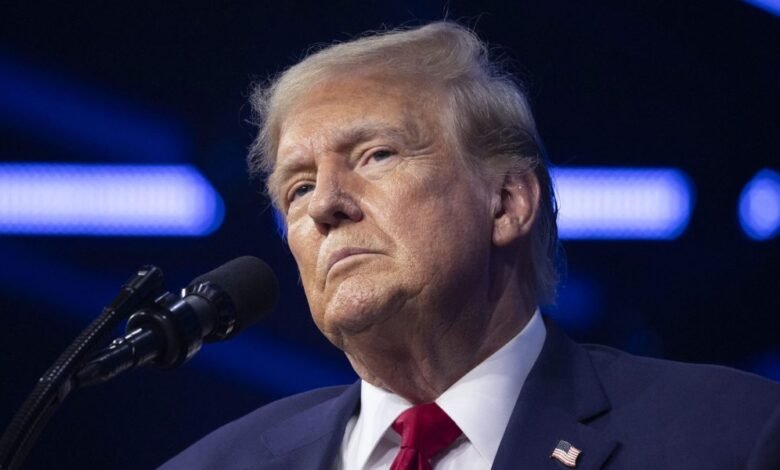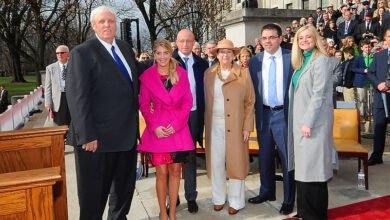No Fortune 100 CEO supports Trump, says Yale business professor

None of the Fortune 100 CEOs — a group that historically leans Republican — have donated to former President Donald Trump’s 2024 re-election campaign, said Jeffrey Sonnefeld, a professor at the Yale School of Management. Fortune.
Just two donated to Trump in 2020, and zero again in 2016, according to new data from Yale’s Chief Executive Leadership Institute, led by Sonnefeld. On the other hand, 28 Fortune 100 CEOs donated to Utah Senator Mitt Romney’s campaign in 2012, and 29 donated to John McCain in 2018.
The number is just one indication that Trump has the “lowest level of corporate support” in the history of the Republican Party, Sonnefeld said. Informed by his close experience working with top CEOs – he has led discussions with the heads of PepsiCo, Ford, UPS, Verizon and IBM, to name a few – Sonnefeld noted that many of them “despise” Trump’s social and tax policies.
These CEOs, a group that is typically 65% to 70% Republicans, will vote “enthusiastically or reluctantly” for Biden, Sonnefeld added. He listed about 30 prominent CEOs, including Melinda French Gates, David Ellison (son of Oracle founder Larry Ellison) and Reed Hastings, as Biden supporters.
The idea flies in the face of several recent articles published in major media outlets suggesting that business leaders are returning to Trump after rejecting him in 2020. Last week, Trump met with dozens of top executives and promised more job cuts. corporate taxes. Stephen Moore, one of Trump’s closest economic advisors and (briefly) his nominee to head the Federal Reserve Board of Governors, said: Fortune that he attended the meeting and the CEOs were “delighted” with Trump.
Economic policies
However, Sonnefeld said top CEOs believe the proposed tax cuts are inflationary without reductions in government spending, an idea Moore dismissed as “completely stupid.” Moore said corporate tax cuts create more demand for dollars by increasing the value of foreign investment.
“When you create more demand for dollars, that means the value of the dollar increases and prices fall relative to the dollar,” Moore said. “That’s what happened after Trump’s tax cut.”
Recent economic studies indicate that Trump’s corporate tax cuts have boosted business investment, but not enough for additional growth to “pay for” those cuts, as the Trump team has long claimed would happen. The Congressional Budget Office estimates that a full extension of the cuts, which will begin to expire in 2026, would cost $4.9 billion over 10 years, including additional interest on the debt. The federal government’s public debt is almost 27.6 billion dollars, or about 108% of GDP.
Regardless, Sonnefeld said corporate tax cuts are more of a concern for the ultra-rich, naming venture capitalist David Sacks and Timothy Mellon, the heir to Mellon’s banking fortune, as voters with an interest in such cuts. Both men supported Trump.
In fact, Biden’s antitrust policies and support for stronger capital gains taxes, which Sonnefeld opposes, are more of a concern for CEOs, he said.
“No one is saying Biden’s policies are perfect and there are some problems,” Sonnenfeld said. “But they are overshadowed by the pernicious threat to inflation, economic stability and, most importantly, democracy posed by Trump’s future presidency.”
The rise of the CEO 2020
Many top CEOs were extremely disturbed by Trump’s rejection of the election results, Sonnefeld said.
On the night of November 6, 2020, when Trump declared himself the winner, Sonnefeld said he received a series of texts and calls from concerned CEOs. They wanted him to bring together a group of business leaders to write a statement asserting that Biden was the true winner of the election.
“I realized that everyone else has money, resources and reputation at stake, and they should realize that I have nothing to lose if it doesn’t work,” Sonnefeld said.
He called 100 CEOs; the next morning, 94 of them attended a 7am Zoom call to write their points. Top executives from Goldman Sachs, Johnson & Johnson and Walmart were there, to name a few, the Financial Times reported at the time.
Sonnefeld declined to name any participants, but noted that the majority leaned Republican. Still, the CEOs, without their staff or press around them, openly condemned what happened the night before.
“It was a very powerful and open discussion,” Sonnefeld said. Acting as scribe, he took notes from the group, first congratulating Biden and Vice President Kamala Harris, then noting that if anyone challenged the election results, they should be prosecuted.
The Business Roundtable, the U.S. Chamber of Commerce, the National Association of Manufacturers and others have published this statement.
After the Jan. 6, 2021, riots, the group met again and unanimously called for Trump’s impeachment, Sonnefeld said.
Moore declined to comment on the group or its activities, saying he was unfamiliar with them. However, he called Trump the candidate for small business, adding that Biden is the candidate for big business and Wall Street interests.
“There’s no doubt about it,” Moore said. He added that given the superiority he viewed of Trump’s economic policies compared to Biden’s, all types of businesses should now view Trump “much more favorably” in this election.
“It’s a different game now,” he said.




